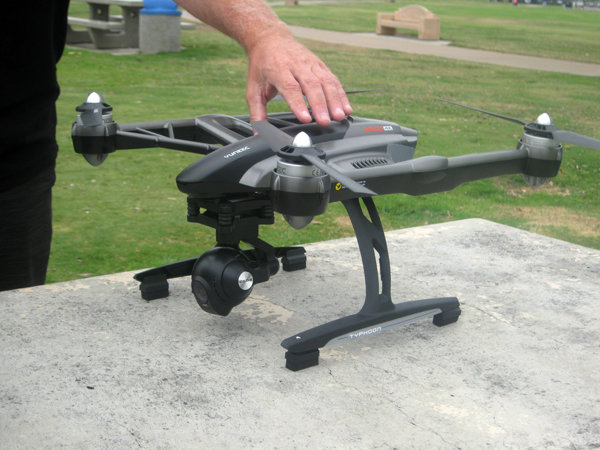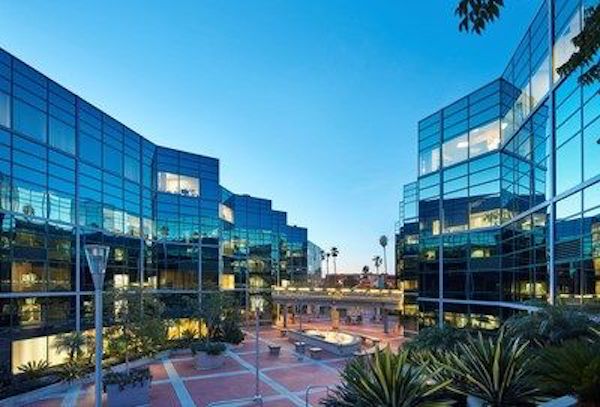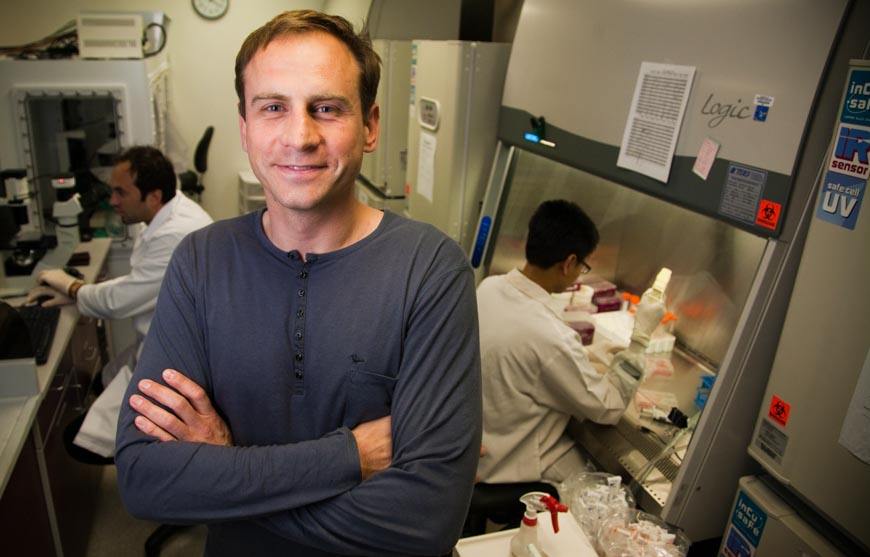Daily Business Report-July 8, 2019
Sanford Burnham Previs associate professor Alexey Terskikh, co-founder and chief scientific officer of Stemson Therapeutics.
Functional hair follicles grown from stem cells
Local achievement could revolutionize hair growth industry
Scientists from Sanford Burnham Prebys have created natural-looking hair that grows through the skin using human induced pluripotent stem cells (iPSCs), a major scientific achievement that could revolutionize the hair growth industry. The findings were presented June 27 at the annual meeting of the International Society for Stem Cell Research (ISSCR) and received a Merit Award. A newly formed company, Stemson Therapeutics, has licensed the technology.
“Our new protocol described today overcomes key technological challenges that kept our discovery from real-world use,” says Alexey Terskikh, an associate professor in Sanford Burnham Prebys’ Development, Aging and Regeneration Program and the co-founder and chief scientific officer of Stemson Therapeutics. “Now we have a robust, highly controlled method for generating natural-looking hair that grows through the skin using an unlimited source of human iPSC-derived dermal papilla cells. This is a critical breakthrough in the development of cell-based hair-loss therapies and the regenerative medicine field.”
More than 80 million men, women and children in the United States experience hair loss. Genetics, aging, childbirth, cancer treatment, burn injuries and medical disorders such as alopecia can cause the condition. Hair loss is often associated with emotional distress that can reduce quality of life and lead to anxiety and depression.
The technology was discovered and developed at Sanford Burnham Prebys. Further development and commercialization activities will be conducted by Stemson Therapeutics. For updates on the technology’s progress and advancement, visit www.stemsontx.com.
____________________

San Diego testing drone delivery program
By Dave Schwab | sdnews.com
Deliveries may soon be coming by way of drones. That is, if all goes well with a three-year testing program. The city of San Diego was selected by the U.S. Department of Transportation to conduct testing as part of the unmanned aircraft systems (UAS) Integration Pilot Program (IPP).
Working with several public and private sector partners, the city has been evaluating the feasibility of advanced UAS operations with numerous applications. Those include unmanned traffic management, night operations, flight over people, and flight beyond the visual line of sight.
And the myriad possibilities inherent in drone delivery don’t end there. Uber is seriously exploring tapping the market for UAS with the creation of a new platform, Uber Elevate.
Even McDonald’s in San Diego has gotten involved in exploring the potential of drone delivery. Starting in San Diego as soon as this summer, the fast-food giant could be delivering via drones.
McDonald’s via Uber, however, won’t be sending drones straight to people’s doors. Rather, drones will be sent to designated “safe landing zones” where human couriers will pick up the food for transfer to residences. Uber has said it might also be possible for drones to be sent to parked Uber cars tagged with QR codes, which will then carry the goods to their final destinations.
— San Diego Community Newspaper Group
____________________

JLL Income Property Trust acquires
medical office buildings in San Diego
JLL Income Property Trust announced the acquisition of Genesee Plaza, a Class A, two-building medical office campus in San Diego, for $90 million.
“The acquisition of Genesee Plaza is a strong fit for JLL Income Property Trust’s focus on medical office buildings as they have historically featured higher tenant retention and delivered stable income. Our focus on reducing risk within our portfolio as we get later in the current economic cycle stems from our investment objectives to deliver stable income and protect stockholder value,” said Allan Swaringen, president and CEO of JLL Income Property Trust. “While we remain underweight to the office property sector which accounts for only 14 percent of our $2.8 billion portfolio, four of our six office properties are medical office buildings.”
____________________
Sam Nejabat appointed to
San Diego Couny Fair board

Sam Nejabat, 28, of San Diego, has been appointed to the 22nd District Agricultural Association, San Diego County Fair Board of Directors by Gov. Gavin Newsom. Nejabat has been president of SJN Properties since 2013. He was a summer legal associate for AT&T in 2018. Nejabat earned a Master of Arts degree in liberal studies from Dartmouth College. The position does not require Senate confirmation and there is no compensation. Nejabat is a Democrat.
____________________

Guest Commentary
Prosecutors should stop the scare tactics.
Reforming murder rule improves our justice system

By Nancy Skinner and Joel Anderson | Special to CALmatters
In January, California ended a decades-old legal doctrine that put numerous people behind bars for murders they did not commit.
Yet six months after the new state law—Senate Bill 1437—took effect, some prosecutors are trying to overturn it, resorting to scare tactics and false distortions.
We are the legislators who wrote and supported this critical reform, and we need to set the record straight about it.
SB 1437 passed the Legislature last year with bipartisan support and was signed into law by then-Gov. Jerry Brown. It reformed California’s outdated and unfair felony murder rule, which had allowed people who did not kill to nonetheless be charged, convicted, and sentenced as murderers.
The old felony murder doctrine allowed prosecutors to charge all accomplices to a crime with first degree murder. It did not matter if there was no intention to kill, if the death was accidental, or if the accomplice had no knowledge that someone else would kill. Everyone was just as responsible, as if they had planned and committed the murder themselves.
The California Supreme Court, in a 1983 ruling, termed the state’s felony murder rule “barbaric.” And yet it remained on the books, and people were unfairly sentenced to long prison terms under this law.
We studied this issue for over a year before passing Senate Concurrent Resolution 48 in 2017. That measure recognized “the need for statutory changes to more equitably sentence offenders in accordance with their involvement in a crime.”
Then in the following legislative session we introduced SB 1437 to correct what we concluded was a grave and needless injustice.
As SB 1437 moved through the legislative process, we made significant improvements to ensure it was fair and that our reform did not let people who are responsible for a murder off the hook.
Based on input from district attorneys and other public safety advocates, we amended SB 1437 to ensure that a criminal was held accountable for murder if they:
• Are the actual killer.
• Aided, abetted, counseled, commanded, induced, solicited, requested, or assisted the actual killer with the intent to kill.
Were a major participant in the underlying crime and acted with reckless indifference to life.
And so it’s been disappointing to see some of California’s district attorneys now working to block the law’s implementation. They remain intent on pursuing murder convictions for people not guilty of that crime, despite the fact that it’s not in the interest of public safety nor is it just.
Yet they have challenged SB 1437 in court arguing it’s unconstitutional on the grounds that it’s allegedly inconsistent with two ballot initiatives California voters passed decades ago.
Before introducing SB 1437, we spent over a year carefully reviewing past statutes, court decisions, and, yes, voter-approved ballot initiatives, to ensure that the provisions in SB 1437 did not overstep our role.
SB 1437 falls squarely within the Legislature’s broad authority to make policy.
Prosecutors have also challenged SB 1437 in the press with mischaracterizations. The president of the Association of Deputy District Attorneys for Los Angeles County, for example, recently told The New York Times that under SB 1437, “We’re literally talking about letting murderers go free.”
That’s a false claim designed to stoke fear.
Thankfully, many prosecutors have properly applied the law, and courts around the state have upheld the reform as constitutional. As a result, many deserving people have been able to go home—some after serving decades in prison for murders they did not commit.
It’s not just those newly freed and their families who have recognized the justice served in these cases. In San Luis Obispo County, after a judge found SB 1437 constitutional, a reporter went to the parents of the victim.
They said that while they still endure the pain of their son’s death, it did not justify an unfair sentence: “It certainly wouldn’t bring closure to me to see him punished as if he were the murderer,” the parent of one murder victim was quoted as saying
SB 1437 is a just and overdue reform. We’re confident that California’s courts will uphold it.
Sen. Nancy Skinner is a Berkeley Democrat, Senator. (Skinner@Senate.ca.gov). Former Sen. Anderson is a San Diego County Republican ( anderson4supervisor2020@gmail.com). They are co-authors of SB 1437. They wrote this commentary for CALmatters.
____________________

San Diego County Fair Facts
Lost and found at the San Diego County Fair, which ended on July 4:
- 132 credit cards
- 69 ID’s
- 138 wallets and purses
- 158 cell phones
- 181 articles of clothing
- 104 pairs of glasses
- 46 items of jewelry
- 89 sets of keys
- 155 miscellaneous items, including: 2 retainers, 3 strollers, one cane, a seat cushion, lots of backpacks and lunch bags, a box of stuffed animals and last, but not least, a Lyft scooter!
- The fair attracted 1,531,199 visitors over its 27-day run — 300 fewer than 2018.
- The 70th annual livestock auction raised $482,776 for 4H and FFA youth.
- Food Fact: Tasti Chips used 50,000 pounds of California-grown potatoes for their famous golden chips. 30,000 orders of Tasti Chips covered with cheese sauce were consumed along with 10,000 of chips with parmesan garlic cheese. Their sister stand, Tasti Burgers, sold 10,000 pounds of french fries which were dunked into 500 gallons of Heinz Ketchup and 600 gallons of Tapatio Sauce.



